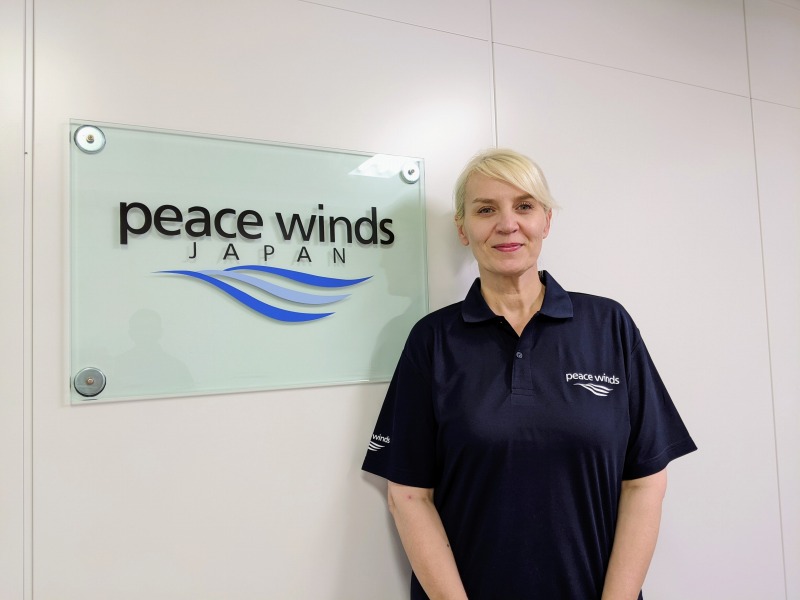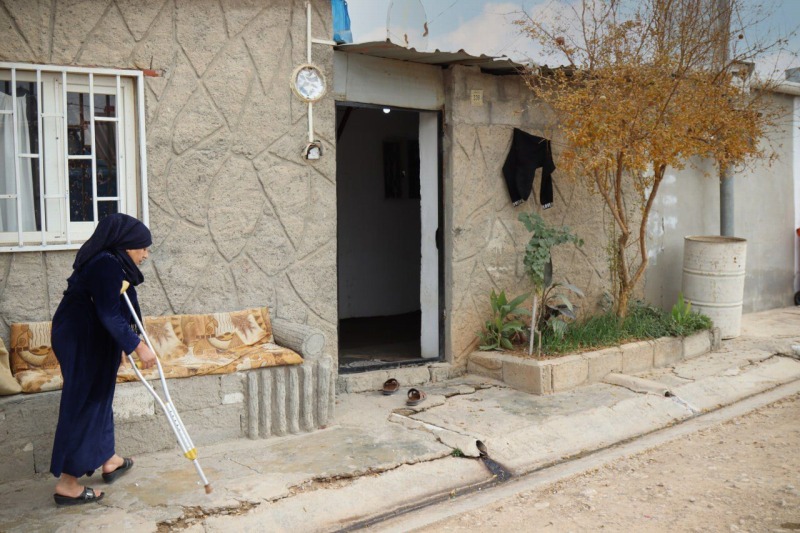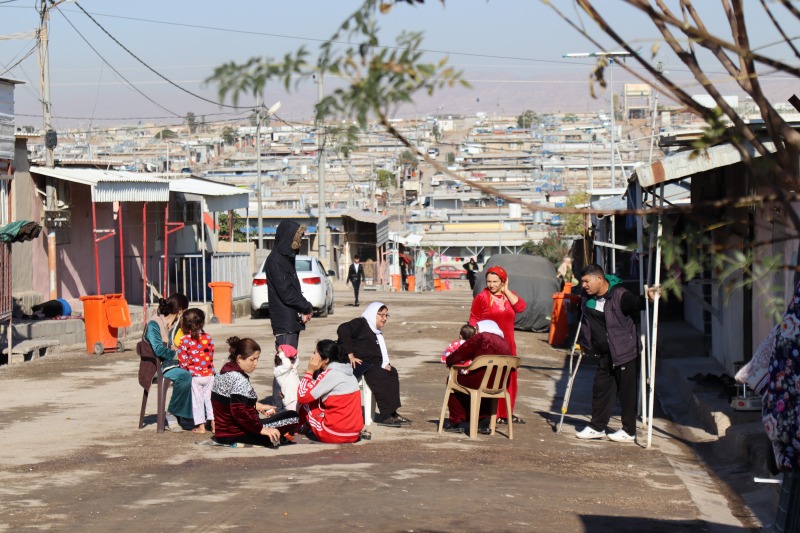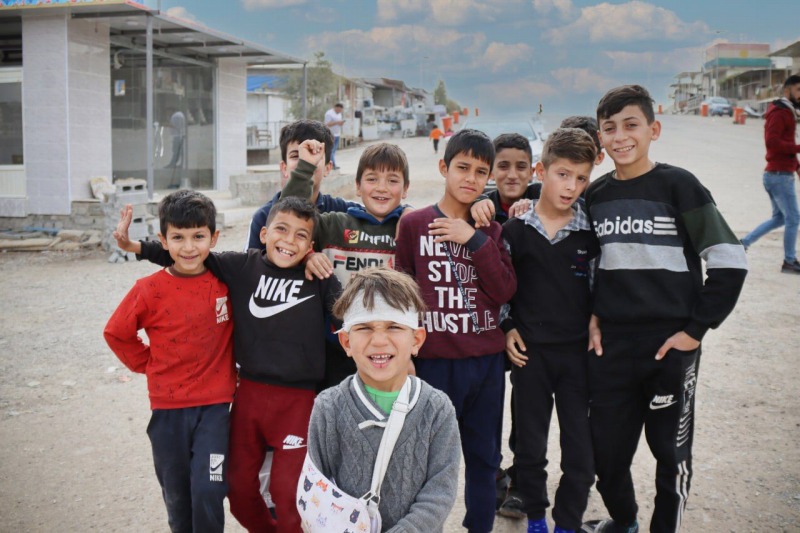World Refugee Day 2023: an Interview with Belma Sisic about Support for Syrian Refugees in Iraq
In honor of World Refugee Day on June 20, Peace Winds would like to bring you the stories of some of our staff members who work to support refugees around the world. They spoke with us about their work with Peace Winds and their hopes for the future.
Belma Sisic lives and works in Erbil, Iraq for Peace Winds’ project for sustainable shelters, camp infrastructure, and livelihoods for Syrian refugees in the Kurdistan Region of Iraq. Her experience growing up in Bosnia and Herzegovina shapes the way she thinks about her work.
–Could you tell us who the refugees living in these camps are and what Peace Winds does to support them?
Sisic: In addition to some 260,000 refugees from Syria, there are about 1.2 million IDPs (internally displaced people) whose lives have been threatened by radical Muslim militias (Daesh). Peace Winds is helping to improve the living conditions of disabled and elderly people in four camps in Erbil and three camps in neighboring Dohuk, with the projects funded by PRM (the U.S. Department of State) and other contributions.
–What do you do?
Sisic: Shelters are not built for persons with disabilities with steps prohibiting the use of wheelchairs, or small toilet space and so on. Our task is to conduct social assessments of the shelter and those who need the help most. Among several upgrades we conduct, the most common ones are installing handrails and renovating latrines from eastern to western styles. In the process, we ask refugees to take part in some decision-making such as design so that they will have some control of the project.
However, sometimes people choose to decline the renovation saying they prefer more space than western-style bathroom or any of the improvements we offer. We understand that because seven or eight people are living in a small shelter and space makes a difference, and so we do not force anything on them, we just continue to explain hoping they will change their mind.
In one case, one of our beneficiaries was a mother of five children, all of them having either mental or physical disabilities. She was assisting them one by one to the toilet when they needed to use it. She was happy to do so with a smile on her face, but it is obvious that it was a hard task for her. Once we renovated the toilet, three of the children could go on their own, reducing the mother’s work. Some neighbors who originally declined our offer came back to us saying they want the renovation too after seeing a success story such as this one.
–What challenges do Syrian refugees living here in Iraq face?
Sisic: Many of the Syrians living in the refugee camps have permission to work, but it is hard for them to get jobs in Kurdistan Region or Federal Iraq area. Even though they get a job, they tend to be paid less than the local people. Many people we see in the camps are professionals such as engineers, teachers, or doctors. These professionals with knowledge sit in tiny shelters and feel “useless.” Think about how psychologically damaging it can be to feel useless.
However, they are so nice when we visit them in the camps. They smile and invite you for a cup of tea and tell us about their homeland. Refugees, especially the ones who are older, just want to go home. I can relate to the pain from my own personal experience.
–What do you mean?
Sisic: I was 13 years old when the war broke out in my homeland Bosnia and Herzegovina. It is a war that victimized 200,000 in an ethnic conflict between 1992 and 1995 when the former Yugoslavia broke apart. My homeland was in a war for three and a half years during my teenage years. I’ve seen horrifying things. I saw shootings and grenades going off. I remember during peace agreements, I had to walk from school to home for about 500 meters on a street that is exposed to snipers.
After the war, people wanted to go home, even to a city like Srebrenica where a genocide took place. There are still people looking for remains of their loved ones. Some of them bury one bone of their loved one that they could find. Regardless of what happened, people still want to go home. That is something I learned from my experience. Younger ones are different, but those who are 40+, they all want to go back. People want to die in a place where they were born and grew up.
When I see children in refugee camps, I am glad they are at least in a safer place, but still, I feel children do not have to go through such tragedies. The 13-year-old myself did not understand what was happening in my hometown. I did not understand why neighbors kill neighbors. I did not understand why neighbors suddenly disappeared. What I did not understand most was where the world was, why nobody is stopping this war. I could not understand.
When I saw the news of a war breaking out in Ukraine last year, I started thinking what to say to my Ukrainian friends, and at that very moment then, sirens go off warning air raid in Kyiv on television, all my body cells start screaming, instantly pulling me back to the 13-year-old child in Bosnia. Now we see the same things in Sudan and Yemen, and I asked myself where is the world?
–Do you find any hope anywhere?
Sisic: We host Tool Service Centers and Workshops that lead to hope for refugee women. As part of the construction support, we provide training opportunities in plumbing, plastering, concreting, fixing home appliances and such. Similar to sewing and beauty salons trainings conducted by other agencies, we provide vocational trainings that would make women skilled workers in construction. They can make more money if they have skills. In an event, on World Refugee Day (WRD) last year, we presented the tools utilized in Tool Service Centers on the stands and distributed flyers explaining about construction trainings, which turned out to be a big hit. This year, the theme of WRD is “Hope Away From Home,” and in support of that theme, our stands are going to state “Hope To Rebuild Homes.” We hope the refugees could build their homes on their own and make a living utilizing their skills when they go home. That is our hope.
This project is funded and supported by the U.S. Department of State: Bureau of Population, Refugees, and Migration and the U.S. Consulate General Erbil.



